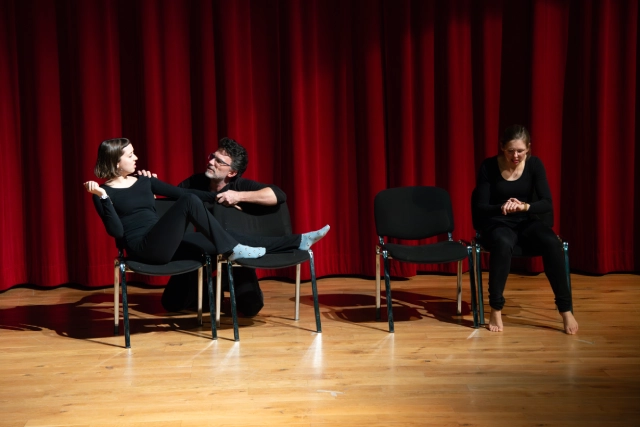A company boss reacted as follows to my offer of “coaching with theatre”: “We already have theatre here all day anyway! We definitely don’t need that for team coaching!” My response was: “If it’s already there, we can just put it on stage and show it in the right light!”
Why should theatre be used in coaching? What added value does it bring?
A whole lot! Theatre reflects reality and enables a free treatment of this reality. Everything that is possible and impossible can be experienced in the theatre. The actual relationships between the group members are protected because the roles are clearly defined. Everyone can reveal something of themselves, but remains protected by their role. The individual interpretation of a role can reveal a lot about one’s own personality, even if this may not be able to be expressed in words. Nevertheless, the personality remains recognisable. The person hides and shows themselves at the same time.
In theatre, reality can be exaggerated, reshaped, repeated, reduced, interpreted and changed at will. These diverse possibilities broaden the horizons of each individual. New perspectives and points of view open up. A group of individuals can become a unit. As the roles can also be swapped at will, “zoning” in the theatre, for example, becomes an unforgettable experience. Theatre is a powerful means of communication. People are involved with their entire body, voice, facial expressions, energy, breathing and emotions. Different postures, voices, energies and emotions can be tried out in order to change the messages that are sent.
Similar to coaching, theatre can work with metaphors. This may make it easier to convey more difficult content and for the audience to view it. As the metaphor first has to be reinterpreted, newly interpreted and parallels sought, the picture only gradually emerges. The audience has more time to process the insights. In addition, the distance between metaphor and reality offers protection and helps to accept difficult messages.
In the “Theatre of the Oppressed” by Augusto Boal (born 1931 in Brazil, writer, playwright, director), difficult situations can be depicted and given different endings. Which ending seems just? What would the situation look like if we were to use a magic wand? How would all participants experience such an ending? This approach is used in many countries to make political decisions or to bring cultures or religions closer together. Here, the focus is deliberately on the future and a solution, similar to coaching.
Theatre and coaching complement each other perfectly. Both worlds are already colourful, diverse, multifaceted and multidimensional!
This article is intended to encourage you to look at what is already there in a playful way and in a protected, benevolent setting. You give your employees and team members the opportunity to get to know each other better, build trust, resolve conflicts and, above all, work together more smoothly.

